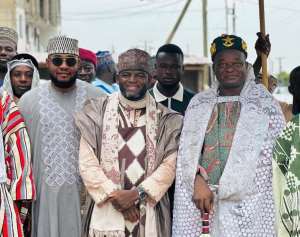
Sheikh Mutawakil Abubakar, the Chief Imam of the Adentan Municipality in the Greater Accra Region, has urged Muslims to uphold the values of justice, equality, and progress while consistently seeking Allah’s blessings.
During his Eid-ul-Fitr sermon last Monday at the Survive School Complex, which concluded the month-long observance of Ramadan, His Eminence Sheikh Mutawakil Abubakar congratulated the youth for embodying the virtues of Ramadan.
He encouraged the community to reflect on their responsibilities as Muslims in shaping their surroundings and ensuring the values of justice, equity, and progress are maintained.
According to him, Islam does not permit Muslims to be mere spectators in society; rather, they are called to engage in reform and contribute to building their communities.
He emphasized that Allah does not burden any soul beyond what it can bear, explaining that this divine wisdom should provide strength during challenging times.
Sheikh Mutawakil Abubakar stated that leadership, governance, and social responsibility are challenges that we are capable of handling.
Below is the full speech:
Harnessing Faith for Community Transformation: The Muslim’s Role in Nation-Building
By His Eminence, Sheikh Imam Mutawakil Abubakari
Bismillahir Rahmanir Raheem.
Beloved brothers and sisters in Islam, Assalamu Alaikum wa Rahmatullahi wa Barakatuh.
On this blessed occasion of Eid-ul-Fitr, we glorify Allah (SWT) for granting us the strength to complete Ramadan, a month of self-discipline, spiritual renewal, and commitment to righteousness.
Today, as we bow in gratitude, let us also reflect on our role as Muslims in shaping our communities and ensuring that the values of justice, equity, and progress are upheld.
Alhamdulillah, as a nation, we have witnessed a successful election—a testament to the resilience of our democracy.
This moment calls for appreciation, not only for the peace and stability that Allah has granted us but also for the responsibilities it places upon us as citizens and believers.
Our faith does not permit us to be mere spectators in society; rather, Islam calls us to engage, reform, and build.
The Mandate of the Ummah: Responsibility and Leadership
Allah (SWT) reminds us in Surah Al-Baqarah (2:286): “Allah does not burden a soul beyond that it can bear…” This divine wisdom should give us strength in times of challenge.
Leadership, governance, and social responsibility are all burdens, but they are not beyond our ability. If we are given peace, we must not waste it. If we are granted security, we must build upon it. If we have leaders, we must hold them accountable while also supporting their efforts for the common good.
We recall the words of the Prophet Muhammad (peace be upon him), who said: “The best of people are those who are most beneficial to others.” (Ahmad, At-Tabarani, Ad-Daraqutni). What, then, is our role as an Ummah? It is not to wait for change but to be the agents of change.
Justice, Equity, and Social Responsibility
Allah (SWT) tells us in Surah Al-Imran (3:110): “You are the best nation produced for mankind. You enjoin what is right and forbid what is wrong and believe in Allah.”
This verse calls us to a life of active engagement—to be defenders of justice, advocates of fairness, and champions of the downtrodden. We cannot speak of development without speaking of justice.
We cannot build communities while ignoring the poor, the orphan, the widow, and the oppressed.
If we truly desire a just and prosperous society, we must uphold integrity in all aspects of life: in business, in governance, in family, and in worship.
The Role of Faith in Development
Development is not merely about roads and buildings. True development is measured by the moral and ethical strength of a society.
We must ask ourselves: Are we raising children who are God-fearing? Are we ensuring that wealth is not hoarded by a few while others languish in poverty? Are we promoting knowledge, skills, and opportunities for the next generation? As Muslims, our faith should be the moral compass that guides our economic and social progress.
The Prophet (peace be upon him) reminded us: “None of you truly believes until he loves for his brother what he loves for himself.” (Sahih Bukhari, Muslim).
This means that our success is tied to the success of our communities. If we want prosperity, we must work for collective upliftment. If we want peace, we must foster unity. If we want good governance, we must promote accountability.
The Path Forward: Building on Our Gains
As we celebrate the end of Ramadan and embrace the joy of Eid, let us not forget our duties: Strengthen our communities through education, skills development, and empowerment.
Promote peace and tolerance, recognizing that diversity is a sign of Allah’s wisdom (Surah Al-Hujurat 49:13).
Support ethical leadership, knowing that governance is a trust (Amanah) from Allah.
Prioritize justice and fairness, ensuring that no one is left behind.
This is the time to translate our faith into action.
The challenges before us as an Ummah are great, but so too is our potential.
Let us arise with knowledge, wisdom, and sincerity, for a strong community is built not by words alone, but by deeds.
May Allah (SWT) bless our efforts, strengthen our unity, and guide us on the path of righteousness.
Eid Mubarak!


